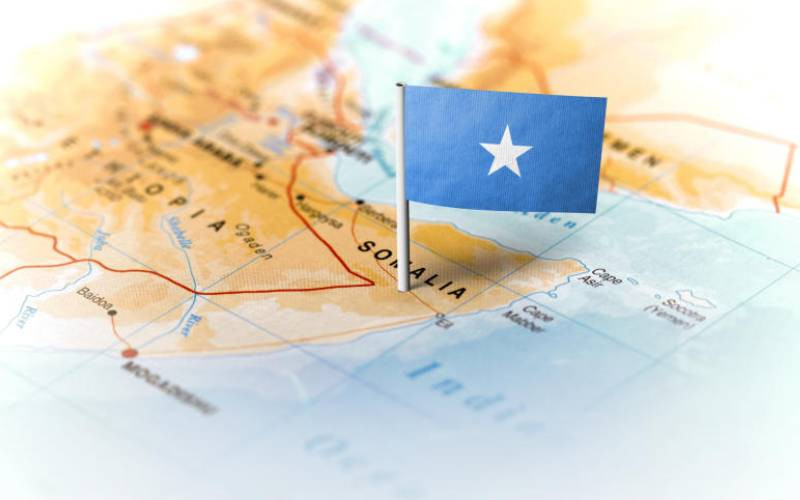
African borders are a complex tapestry reflecting a rich mosaic of ethnic groups and cultures that span multiple nations.
Beneath that patchwork, there are smouldering issues of ethnonationalism, which is too visible in Somalia in relation to its neighbours.
Consequently, Kenya and Ethiopia find themselves at a particular juncture where dealing with Somalia's expansionism has become a critical issue to preserve their territorial integrity, regional stability and peaceful coexistence.
Across the continent, many ethnic groups straddle borders that separate African nations. Borana in Ethiopia, for instance, extend all the way across the Kenyan border, while Afar in Djibouti shares blood ties with their brothers in Ethiopia.
The Maasai people too, live in Kenya and Tanzania.
In 1964, African heads of state convened in Cairo and made a solemn pledge to respect the borders on their achievement of national independence.
This resolution, borne out of the need for harmony among African nations, aimed to prevent border conflict caused by ethnic affiliations. Yet, Somali irredentism poses a serious threat to this framework of border stability.
Entrenched in the principle of inherited ownership over all territories Somalis inhabit in East Africa, Somalia has historically disputed the borders of its neighbouring countries.
In the 1960s, insurgencies were ignited in Kenya and Ethiopia, with Somalia asserting claims over Somali-inhabited regions, and later on in 1977, Somalia directly waged war on Ethiopia in an attempt to seize the Somali region of Ethiopia by force.
Despite the African Union's principle to respect colonial borders, Somali elites never cease to advocate the regaining of these perceived "missing territories".
President Hassan Sheikh who recently protested the MoU between Somaliland and Ethiopia, underscored this sentiment and openly declared that there are territories Somalia is supposed to reclaim (Implying the Somali regions of Ethiopia and Kenya) and described Ethiopia as a traditional enemy to Somalia.
In a similar vein, Somalia-born US lawmaker Ilhan Omar has stated that her origin country, Somalia, will one day search for its missing lands.
In late 2006, Sheikh Hassan Dahir Aweys, head of the committee of the Islamic Courts Union (ICU) that then controlled much of Somalia, declared, "We will leave no stone unturned to integrate our Somali brothers in Kenya and Ethiopia and restore their freedom to live with their ancestors in Somalia."
On January 3rd this year, the Somali Ministry of Interior, Federal Affairs and Reconciliation released a poster featuring a map of a previously unrealised Greater Somalia, with the Somalia flag drawn over all Somali inhabited areas, including parts of Kenya and Ethiopia, although it was later deleted.
Stay informed. Subscribe to our newsletter
This ethnonationalist philosophy being promoted by Somalia puts regional security and stability in danger.
To mitigate Somali irredentism, official recognition of the Republic of Somaliland as a sovereign and independent nation emerges as a pivotal solution. This could end the dream of uniting all ethnic Somalis under the Somalia administration and uphold the African Union's pledge to respect existing borders at the time of independence as articulated in the 1964 AU declaration.
Such recognition not only realises Somaliland's long over-due dream of recognition but also serves as a deterrent against further ethnonationalism ambitions.
In light of the recent MoU between Ethiopia and Somaliland, Ethiopia will become the first country to officially recognise the Republic of Somaliland as a sovereign nation.
Kenya, with its Somali-inhabited regions, faces a similar imperative to protect its territorial integrity against Somalia's ethnic expansionism and prevent future border disputes.
Kenya must uphold the AU 1964 declaration of adhering to colonial borders and support the recognition of Somaliland.
The recognition of Somaliland serves not merely as a diplomatic gesture but as a strategic step for safeguarding the security and prosperity of East Africa. The time for action is now.
-The writer is the First Secretary of the Republic of Somaliland mission in Kenya
 The Standard Group Plc is a
multi-media organization with investments in media platforms spanning newspaper
print operations, television, radio broadcasting, digital and online services. The
Standard Group is recognized as a leading multi-media house in Kenya with a key
influence in matters of national and international interest.
The Standard Group Plc is a
multi-media organization with investments in media platforms spanning newspaper
print operations, television, radio broadcasting, digital and online services. The
Standard Group is recognized as a leading multi-media house in Kenya with a key
influence in matters of national and international interest.
 The Standard Group Plc is a
multi-media organization with investments in media platforms spanning newspaper
print operations, television, radio broadcasting, digital and online services. The
Standard Group is recognized as a leading multi-media house in Kenya with a key
influence in matters of national and international interest.
The Standard Group Plc is a
multi-media organization with investments in media platforms spanning newspaper
print operations, television, radio broadcasting, digital and online services. The
Standard Group is recognized as a leading multi-media house in Kenya with a key
influence in matters of national and international interest.






